Online trolls are an unfortunate part of life. While the Internet connects us, it also enables people to spew hate for no apparent reason.
A survey from The Daily Mail, a leading UK news agency, provides insight into some of the platforms that attract the most trolls, with Facebook taking a commanding lead.
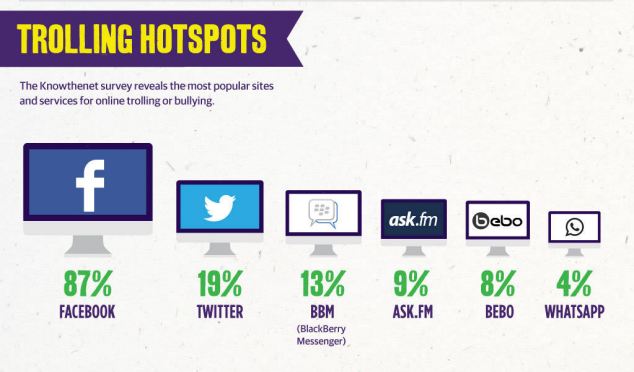
I’ll be upfront with you about the way I handle haters of my personal brand.
I ignore them.
That’s my method, so I’m not telling you to do the same. It’s simply been an effective method that has allowed me to stay sane and keep my personal brand intact. Ignoring it.
Obviously, not every brand can ignore the hate.
Some companies respond in creative and humorous ways that turn into huge wins.
As brands such as Nestle, Amy’s Baking Company, and Dark Horse Cafe found, managing your online reputation by responding to attacks can backfire, creating havoc for the brand.
Because of the high risk of big mistakes in online reputational management, I put together this guide for what to do if someone attacks you online.
But first, we’ll review what trolls are and the true costs of negative comments.
What is an online troll?
Online trolls are people who frequent forums, chat rooms, comment wells, social networks, and other corners of the Internet to incite strong angry responses from their victims. These people are typically proud of their accomplishments. This troll even brags about his exploits.
When you get upset with trolls, you are playing into their hands—you are feeding them.
Do not feed the trolls.
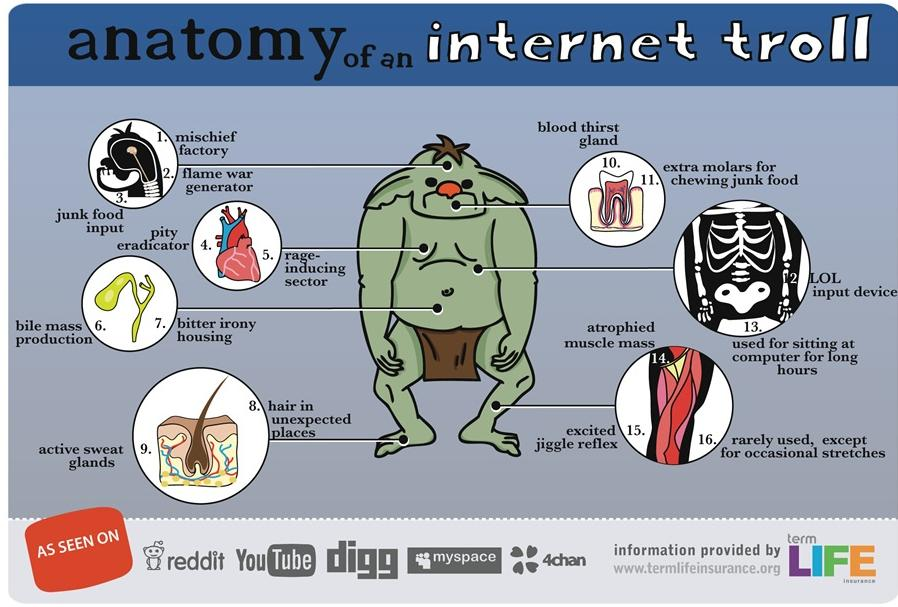
Feeding the trolls only makes them stronger, and they push harder. It also lowers you to their level, where they’ll always win because of their vast experience. You’ll only get upset and act irrationally—while doing it on public forums.
This means it’ll stay on the Internet forever for other people to see. Sometimes, your reactions will be saved as screenshots so you can never delete them.
It makes the costs of negative comments left by trolls high.
The cost of negative online comments
While there’s an old adage that purports that all press is good press, this isn’t necessarily true, as Amy’s Baking Company found in its war against trolls.
Despite what insurance commercials on TV say, people turn to the Internet for information. They especially trust product and company reviews.
A negative review left by a troll can have a lasting impact on sales numbers.
A recent survey by Moz found that nearly 70% of respondents were turned off of buying a product or service because of negative online reviews.
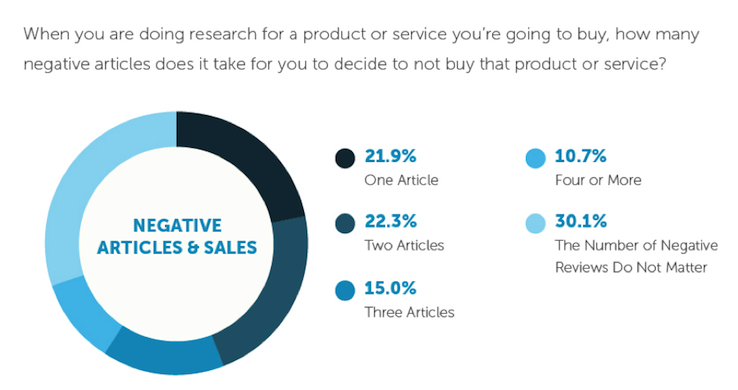
And that’s not all. Online reviews aren’t the only trustworthy source. Word of mouth on social media has been shown to effectively work both for and against brands.
Recent research by the Internet Sales Group found one negative social media review can cost you 30 new customers.
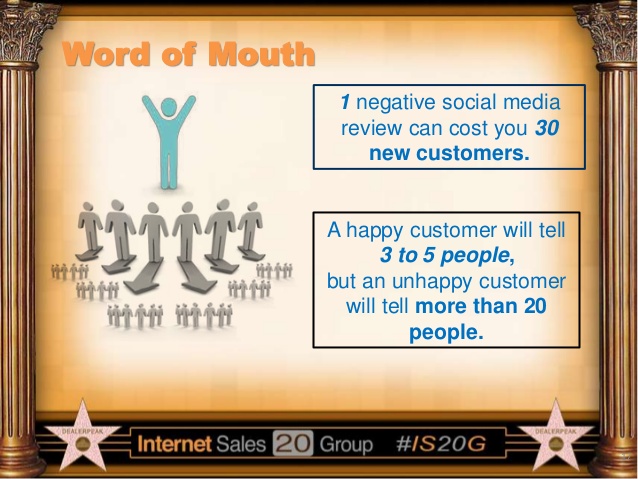
Unhappy people simply enjoy banding together and making their voices louder, so while a happy customer will discuss your brand with 3-5 people, an unhappy customer will tell over 20 people about their bad experience.
This inspired Adrien Chen and Jason Pontin at the MIT Technology Review to explore the true costs of trolling, although they ended up focusing more on what it costs the troll than the victim.
And it turns out, responding to trolls (although not directly) may actually be the most effective policy.
How to respond
I don’t respond to trolls, but others do. It’s a stigmatizing issue, and clearly even adults don’t know what to do about bullying.
Some marketers, like Curtis Snyder at Make Your Mark Media, recommend confronting trolls head on. There’s value in that although Kendall Walters at Hootsuite reminds us not to confuse a troll with a genuinely upset customer.
Whitney Gibson at Social Media Explorer posits that the decision whether or not to respond to negative comments depends on a variety of factors. You have to assess the risk of the attack before determining the correct course of action, and it needs to be done fast.
Social media moves fast, and you have a maximum of 24 hours to respond to negative comments effectively. It’s a very small window.

To help make these split-second decisions, here’s a handy infographic on how to respond to negative social media comments. It’s full of useful advice on how to keep calm and carry on:
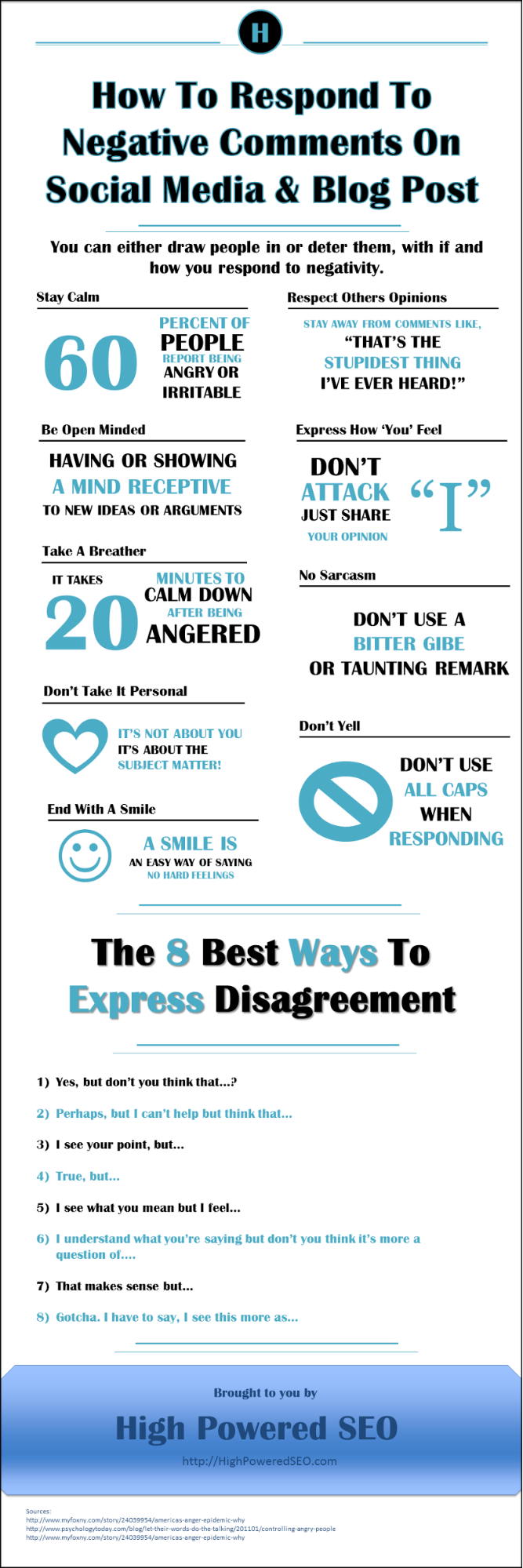
Of course, how you handle the situation is up to you. Some brands with edgier attitudes find success shutting down online trolls the way a stand-up comedian treats hecklers. Others have run into PR nightmares attempting to retort.
I don’t personally respond to negative comments or reviews, but if I ever come across something false, I do report it to be removed.
I’ve never minded legitimate feedback and criticism, even the occasional hater, but I won’t tolerate lies and misinformation.
Reporting trolls to admins
Regardless of the platform, there are community rules and guidelines for how people should act. In places like 4chan or the darknet, the rules are looser, but on social networks like Facebook and Twitter, they’re extensive.
Here’s how to deal with Facebook trolls. Profiles, comments, and posts can be reported to group admins, or blocked and reported as abusive to Facebook directly.

If you read an offensive tweet, you can simply block the person so you won’t see them ever again. They can still see your tweets, however, and everyone else can still read theirs.
When Twitter trolling gets out of hand, reporting it is easy: click or tap the three dots at the right of the tweet and report each tweet before reporting the individual who posted them to Twitter’s admin.

Yelp reviews can be reported similarly to Facebook’s. If you receive a bad review from a Yelp troll, don’t be afraid to swing the banhammer. And yes, Yelp trolls do exist, and there’s an entire underground community of them.
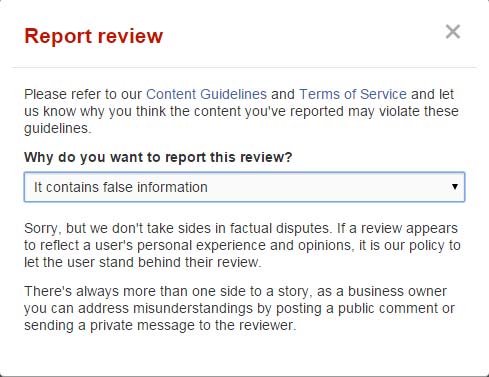
And it doesn’t stop there: you can report inaccurate and false content to Google, FourSquare, Reddit, Instagram, or wherever else you find it online.
It doesn’t stop at social networks, forums, and online review sites. The Internet is regulated much more than you think, and there are checks and balances in place on every level to keep things as civil and clean as possible.
That’s right, if a blogger or other outlet creates a site that falsely represents you, it’s possible to even have it removed from Google search results. This should be done only in extreme cases and may require alternative means of removing false information.
Alternative ways to remove false information
The Internet has been around long enough now that disputes over negative online content have reached every level of our court system.
In response to negative publicity, some online SEO and marketing agencies rebranded themselves as reputation management services. These firms use SEO techniques to help bury negative search results under pages of positive ones.
The ethics of such services is debatable, though I suppose the same could be said of legitimate SEO and marketing services.
Some companies take things as far as the court system, suing people over negative reviews. The courts have sided with web services and platforms such as Yelp, placing liability on consumers to post honest reviews.
Still, web-based lawsuits in every industry continue being heard in federal courts:
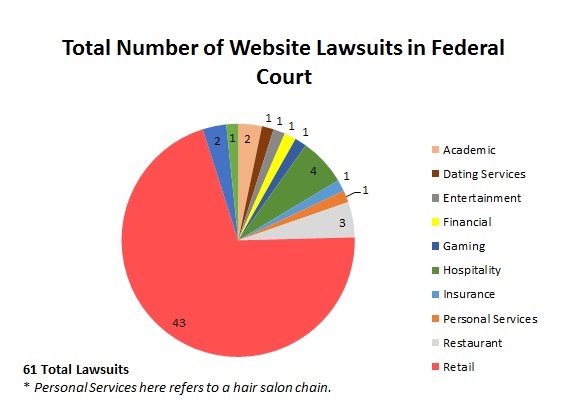
Because of the first amendment’s rights and freedoms and the split between content creators and platform owners, web admins aren’t always required to remove web content.
Sometimes Google will adhere to court orders regarding search results; however, there are volunteer and nonprofit projects that are dedicated to archiving and documenting any web pages Google removes due to court orders and other actions.
Attempting to shape conversations in this way can quickly become a slippery slope, which is why I typically do my best to avoid it.
Still, every situation is different, and if you’re reading this article, you need all the information possible, which is what I’m aiming to provide.
I want to remind you once again (and I realize I’m getting repetitive) that if at all possible, ignoring the situation is best. I do, however, work in a B2B industry, so I deal with more professional clients and reviews.
Conclusion
You never know when it will hit. One minute you’re minding your own business, commenting on an article you just read, and the next thing you know, you’re defending your religion, sexuality, political affiliation, race, age, profession, and your entire life because of some stranger.
Trolls lurk in every corner of the Internet, seeking to victimize people, spreading their negativity.
Responding to trolls only feeds them and makes them stronger, so it’s best to ignore them whenever possible.
However, sometimes negative commenting escalates to personal attacks, false information, and other dirty tactics meant to disrupt business in unethical and often illegal ways. Sometimes, trolls take things too far, and it affects your business.
In these cases, it’s okay to respond, defend yourself, and work in the backend to have inflammatory and malicious content removed from the Internet.
The web will never be a safe place, but it’s up to you to take the high road.
How have you dealt with online attacks on your brand or business?
